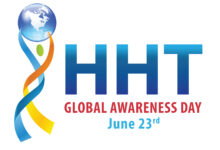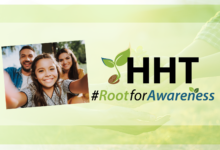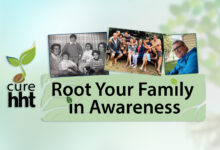What the HHT?
A blog for the HHT community
Posts by Riley Blevins
HHT Global Awareness Day
June 23rd is HHT Global Awareness Day! While we work to raise awareness all year long, HHT Awareness Month is a time where we ask our community to get especially loud!
Cure HHT is the only patient advocacy organization in the world funding research, awareness and education for HHT patients, their families and the medical/scientific community. Rally your family and friends to join our fight to raise awareness and save lives!
Read MoreUncovering Your Roots: Decoding Genetic Testing (RECORDED)
Discover the power of genetic testing as we uncover the roots of HHT! Join us for an enlightening online education opportunity with Theodore Drivas, MD, PhD, University of Pennsylvania HHT Center of Excellence, and Genetic Counselor, Zahra Girnary, University of North Carolina HHT Center of Excellence, who will guide you through the process of genetic screening, as well as explore the valuable insights that genetic screening can provide for your individual HHT care.
Read MoreRoot for Awareness – Crowdfunding Campaign
This year, in place of our virtual walk – Strides for Strength – we thought we’d change things up and branch out (pun intended) as we spotlight the importance of understanding your family’s HHT roots. Your stories of both struggle and triumph help people take notice! Fighting for awareness and making HHT more recognizable, however, does come at a cost. But hey, nobody said we couldn’t have a little fun while we do it! Rally your family and friends to help share your story, raise money for an amazing cause, and compete to WIN AMAZING PRIZES along the way!
Read MoreHHT June Awareness Month
Just one HHT diagnosis has the potential to save the lives of many! As a genetic disorder – passed down from parent to child – the diagnosis of HHT for a single family member can branch into answers and life-saving treatments for several generations of a family! When we say HHT awareness saves lives…it’s not an exaggeration.
Though we have made great strides in shining a light on HHT over the years, we still need your support to make HHT a more recognized disease! Donate today to help HHT Awareness take root in your community — plant the seed of awareness!
Read MoreSeattle National Conference
HHT Patient & Physician Conference
Seattle, Washington | June 3-4, 2023
Register today to join us for our National Patient & Physician Conference on June 3-4, in Bellevue, Washington just outside of Seattle. Medical professionals can now receive CME credits for participation. This is an in-person conference. Registration is now open.
Read More




